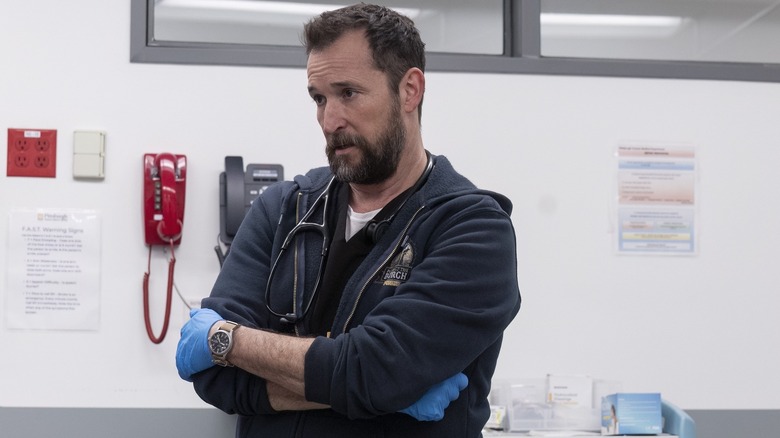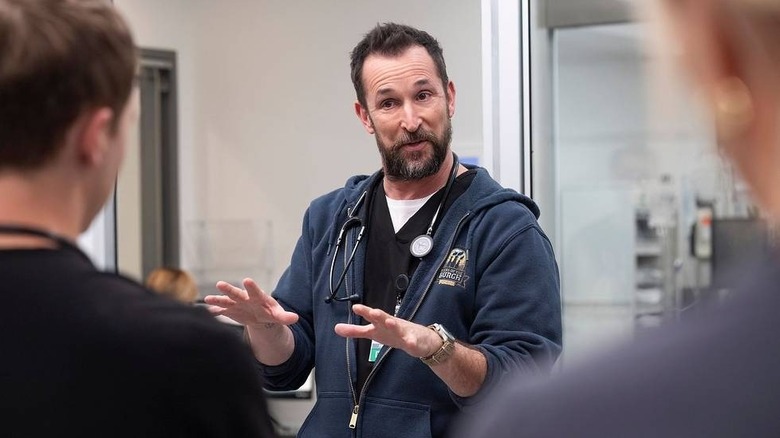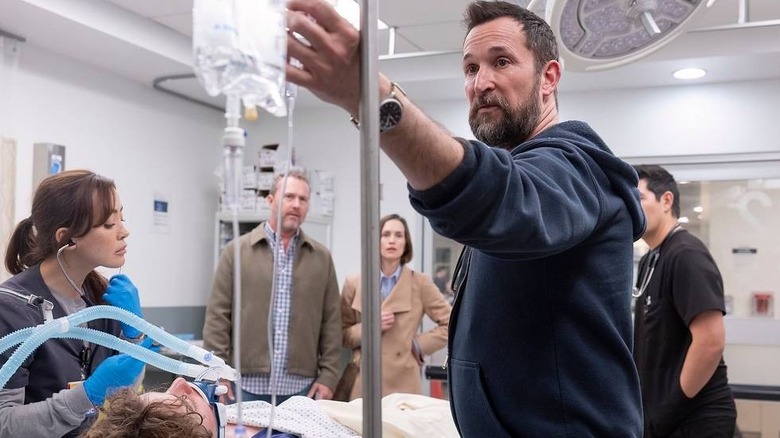How The Pandemic Gave HBO One Of Its Biggest Shows In Years
Remember 2020? It sucked, to put it lightly. In March, the world basically shut down due to the massive surge of the COVID-19 pandemic, for which there was no vaccine until 2021. The entertainment industry closed its doors while the medical community underwent a horrifying crisis. These days, COVID is still, to be clear, a big problem — cases of long COVID can be unbelievably dangerous, and vulnerable populations still need to safeguard against it — but it's not the worldwide upheaval it once was. From this, though, HBO Max's massive hit series "The Pitt" emerged. How? Let former "ER" star Noah Wyle, who works as an executive producer and stars as Dr. Michael "Robby" Robinavitch on the series, explain.
In an interview with The Wrap, Wyle, who crafted the show with fellow "ER" veterans John Wells and R. Scott Gemmill, told Steve Pond that it felt "instantaneous" when the landmark NBC medical drama started airing in 1994, and "The Pitt" had a slightly slower surge in popularity but gained a legion of fans nevertheless. (As a refresher, Wyle played medical student turned trauma attending Dr. John Carter, but it's important to remind everyone that "The Pitt" is not a spin-off of "ER."
"It's maybe less in volume and a bit more in earnest, if that makes sense," Wyle told Pond. "People don't just want to tell me that they enjoy it. They want to tell me that it affected them and resonated with them in a way that was very personal."
After saying that he's met people who lost family members to ailments seen in the show, Wyle continued: "These storylines were very contemporary, and they seemed to affect a lot of people who are identifying with wanting to fall on the floor and cry and have a breakdown post-COVID. We've all been carrying a load that we haven't quite been able to put down."
When Pond asked if "The Pitt" would have happened if COVID hadn't happened, Wyle was quite clear. "No, definitely not. Because I would never have wanted to do it, and neither would John or Scott." He went on:
"That was the catalyst for all of this — that post-COVID, there might be another story to tell about American healthcare that shined a light on the two different healthcare systems that exist in this country, the disparity between the two and the toll that it was taking psychologically, emotionally and financially on the frontline workers. Without COVID, there would've been no need for me to put a stethoscope on my neck ever again."
Noah Wyle says The Pitt allowed him, John Wells, and R. Scott Gemmill more freedom with their storytelling
When you consider that "ER" aired on network television and "The Pitt" airs on HBO Max, you'll realize something pretty important: HBO Max allows for way more creative freedom. In his interview with Steve Pond, Wyle was unequivocal about the fact that the new series isn't a do-over, per se, but an opportunity to try new things while also bringing in the best things he learned working on Michael Crichton's series. "A lot of what 'The Pitt' came out of was the thought, 'If I ever get the chance to do it again, who would I want to do it with and what would I want it to feel like?'" Wyle mused. "I thought back to those early days on 'ER' and that sense of camaraderie, ownership, commitment. Those were the sensibilities I brought into the formation of this show."
Wyle even said to Pond that a driving creative force was wondering what he, John Wells, and R. Scott Gemmill never addressed on "ER," and the answer was unsurprising: the Emmy nominee listed relatively modern crises and issues like "fentanyl overdoses, mass shootings, trans rights, healthcare cuts, nursing shortages, [and] COVID burnouts." From there, Wyle says he and the show's team spoke to real healthcare workers to figure out how to best represent them.
"And then we spoke to many amazing experts from every vector of healthcare, and we'd finish those interviews by saying, 'What would you like to see on TV? What isn't on TV that should be? And what would be bad and counterproductive for us to put on TV?'" Wyle said before revealing that a major storyline at the end of the show's fourth season came directly from these conversations. After dealing with victims of a mass shooting, Robby is taken aback by a young patient suffering from measles who turns out to be unvaccinated, and whose parents won't allow him to perform a life-saving treatment, because they believe the dangerous disease will simply run its course.
"When we spoke to people that deal with vaccination rates and infectious diseases, that pushed us toward looking at diseases that had been eradicated but might come back because people weren't vaccinating their kids," Wyle said, acknowledging that a real-life measles outbreak coincided with this on-screen story. "We guessed right with measles, because the outbreak in the Southwest was the same week the episode aired."
In season 2 of The Pitt, Noah Wyle says the show will tackle some extremely current issues in healthcare
Still, Noah Wyle told Steve Pond that keeping up with the news — and showing it on-screen — has presented a challenge, in that the news moves at a rapid-fire pace every single day. "But the hard part now is that events on the ground are moving so quickly that it's a scary thing to predict," Wyle said before continuing:
"We've planted a flag that we are trying to be an accurate representation of a major-city trauma center. And major-city trauma centers are going to become even more crowded when rural hospitals start closing. A lot of people are gonna lose their health insurance, and they're gonna make enough to not qualify for one plan and too little to qualify for another, and they'll find themselves in this growing group of people who need assistance and can't find it through the normal channels."
Wyle is, here, referring to President Donald Trump's bill that he signed into law on July 4, which he characteristically dubbed "The One Big Beautiful Bill." The bill, to put it lightly, is poised to create a series of disasters in the American healthcare system, making it that much harder for people to get the care that they need — especially for people on Medicaid, which was slashed in the bill. R. Scott Gemmill, John Wells, and Wyle have all been pretty outspoken about the problems inherent in American healthcare, and it's unsurprising that they're tackling this catastrophic bill on "The Pitt" in season 2 — and I don't say catastrophic to be hyperbolic, but Wyle is right that large portions of the bill will close hospitals and kick patients off of their insurance plans.
With all that in mind, Wyle said there's another important aspect to "The Pitt" and what it does for healthcare workers. "But also, the challenge is, let's find the levity here," he remarked. "It's prescriptive for the practitioners to find a sense of humor in it all. So we model ours on theirs. It's gallows humor, it's black humor, it's foxhole humor. It's an attempt to not become cynical or jaded."
"The Pitt" returns for season 2 in January, and for now, you can watch them tackle hot-button issues in season 1 on HBO Max.


